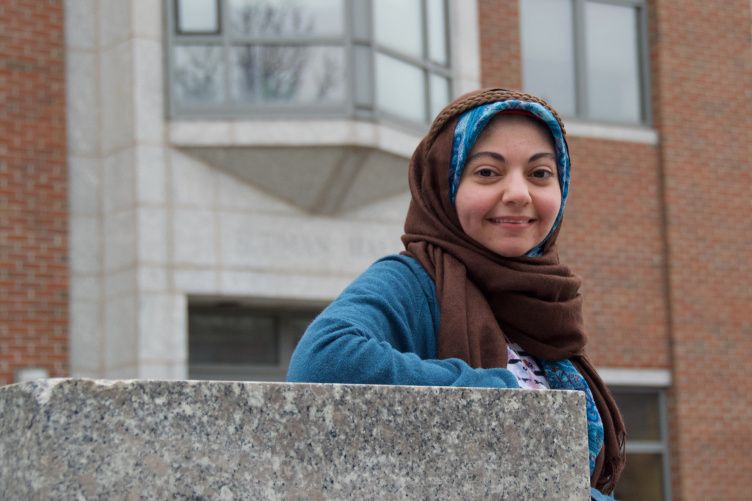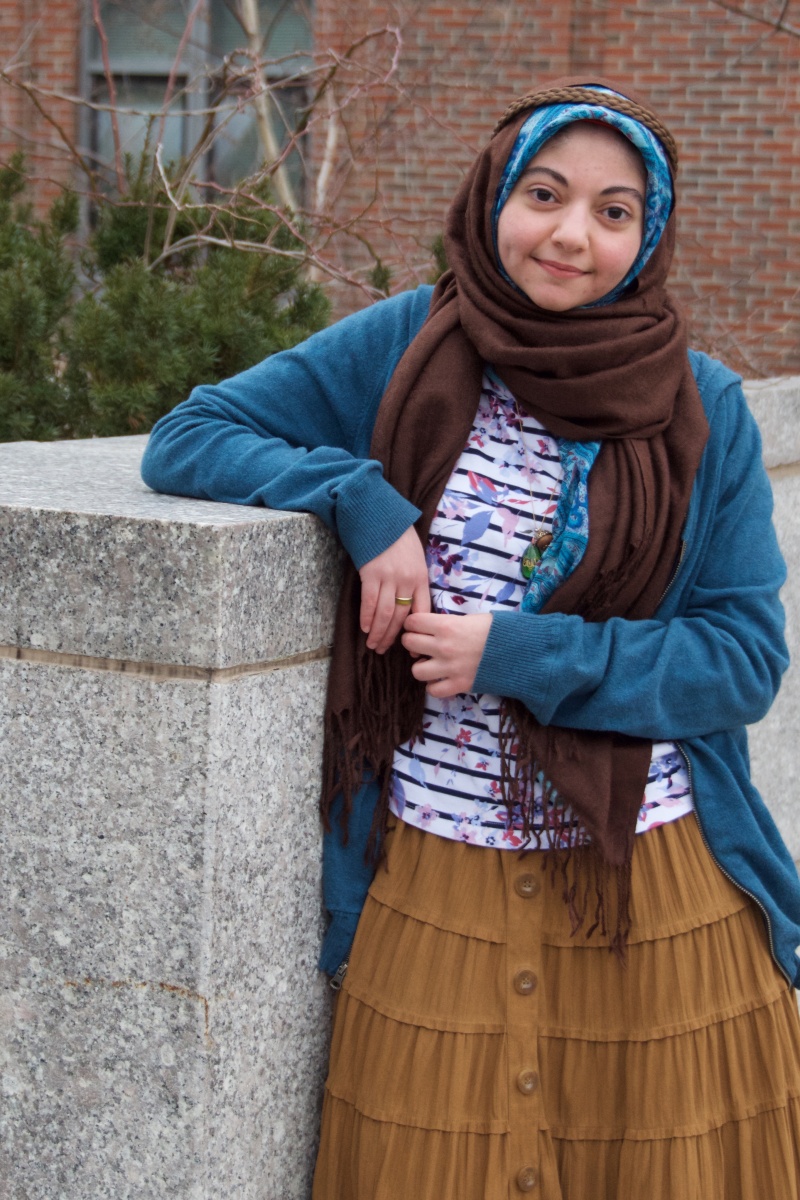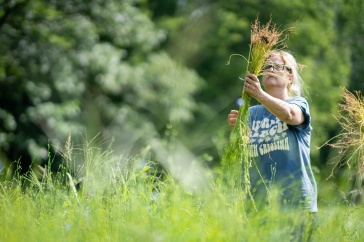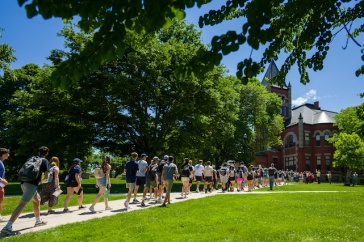
Yussra Ebrahim '16 stands outside of Rudman, one of the campus buildings where this sustainable agriculture and food systems major has spent many of her days on campus.
The last time Yussra Ebrahim ’16 visited Iraq she was 8 years old. She thought it was a family vacation, a time to be together with relatives who lived an ocean away, and she could not comprehend why the adults in her family seemed so worried.
At the URC: Bringing Food Education to School
As a sustainable agriculture and food systems major, Yussra Ebrahim ‘16 was stunned to find out how little she knew about the origins of the foods she was consuming prior to her studies at UNH.
“I ended up learning a lot more than I ever expected,” Ebahim says.
That realization inspired Ebrahim’s senior thesis, a study into what high school students know about food security and sustainability. Ebrahim will present her findings at the COLSA Undergraduate Research Conference in April.
Her thesis project began with designing an online survey geared toward high school students, which Ebrahim completed last semester, working with her mentors in the department of biological sciences, associate professor Jessica Bolker and assistant professor Carrie Hall.
Ebrahim is also coordinating with one of her former teachers from Portsmouth High School to bring the survey directly to high school students, first in an online form and then again following a class presentation where she plans to review the initial responses, answer questions and begin a dialogue on topics including sustainability, GMOs, factory farming, organic practices and students’ own habits for choosing foods.
“People used to know that if you wanted to eat, then you had to be a farmer. But now, that’s not the case, and we haven’t adjusted our education system to reflect that,” Ebrahim explains, which means many people are unaware of the practices that go into bringing the foods they eat to the grocery shelves and, ultimately, to their tables.
Ebrahim hopes that by repeating the survey after her presentation and the class discussion, the results will show how much students can learn in one short workshop.
“I hope to make the case that we need this type of education in our schools,” she says.
“It was three weeks before the occupation in 2003,” she recalls, sitting on a sofa in the basement of Rudman, one of the buildings where she has spent so many of her days as a sustainable agriculture and food systems major at UNH. “I didn’t realize we were there to say goodbye.”
Many of those family members have been killed in Iraq in the 13 years that have passed, Ebrahim explains, and her family has not been able to go back since.
As a child, the Portsmouth resident imagined one day moving to Iraq, and as a student at Portsmouth High School, she realized what she wanted to do for her career: teach. Ebrahim still plans to teach, and has been accepted into Emerson College’s Master of Fine Arts in creative writing program, but her childhood dreams of going home to the country of her parents and grandparents have changed.
“We hoped it would get better, but it has only gotten worse there,” she says.
From the perspective gained through her experiences as a Muslim woman raised and educated in New Hampshire, Ebrahim recalls the myriad emotions assailing her as news broke of the Paris attacks on Nov. 13, 2015.
“When it first happened, there was that reaction of horror and sadness and anger,” she says — feelings shared by many of her UNH classmates. But as she scanned the headlines and articles online to find who was to blame, she kept thinking, “Please let it be anyone else. Please let it not be tied to my faith.”
When the suspects were named, along with descriptions of connections to the Islamic State (ISIS), and she read the reactions online, Ebrahim’s anger grew. It was not, she explains, even the hatred vented by those who cannot differentiate extremists of any religion from the religion itself that angered her the most.
Ebrahim describes her struggle as she saw the outpouring of grief and support for Paris in the absence of any for Iraq, Syria and other countries where killings by militants barely receive a blip on the mainstream media’s radar: “ISIS attacks Muslims on a daily basis — in any given week there may be the same death toll as in the Paris attacks — and we hear nothing about it,” she explains. “I, too, was sad for Paris, but I was also saddened at the inequality in the world. Grief is good — but I wanted grief for the Middle East, too.”
In the midst of this storm of emotions, Ebrahim began writing. As a writing minor and a tutor in UNH’s Connors Writing Center, Ebrahim has balanced her love of biology, animals and the natural world with her love of English and the written word.
"UNH has wonderful professors, and I am very blessed to have worked at the Connors Writing Center these past three beautiful years," she says.
Alongside her work studying food security and sustainability for her thesis, she began writing an autobiographical essay entitled “Vigil,” which uses as its narrative UNH’s vigil for the victims of the Paris attacks to weave her own experiences and eventual journey to a place of peace and hope.
Ebrahim found herself standing at that vigil, listening to each speaker — reliving a litany of conflicted emotions — until the last speaker of the evening addressed the crowd.
When Rev. Larry Brickner-Wood, chaplain and executive director of the Waysmeet Center, United Campus Ministry to UNH, spoke, everything changed, Ebrahim recalls.
With each mention of the tragedy in Paris, he also recalled other places where militant extremists have taken innocent lives — places like Iraq, Syria, Lebanon.
“He said, ‘This act has no faith.’ For the first time in a week, I was not angry,” she says. “I had wanted the right to grieve.”

Now Ebrahim is working on selecting a passage from her 13-page essay to share at the Naked Arts event, part of April’s Undergraduate Research Conference.
The essay follows her transformation during that week, beginning with the anger and pain, proceeding through the moments of confusion and ending with the peace she found in the final remarks of that vigil.
Looking to the future, Ebrahim hopes to use her love of writing to help others. When she started thinking about the end of her undergraduate years at UNH, she knew the time had come to decide whether to pursue graduate study in writing or the sciences.
Ebrahim said she felt compelled to follow her path as a writer and, hopefully, help others use their stories to bring about positive change.
In these times, “hatred is coming to the surface” against many who are perceived as “others,” she explains: “It is no longer thought but not said, and that means we can address it.”
The 17th Annual URC takes place April 11-23, 2016.
-
Written By:
Jennifer Saunders | Communications and Public Affairs | jennifer.saunders@unh.edu | 603-862-3585



















































